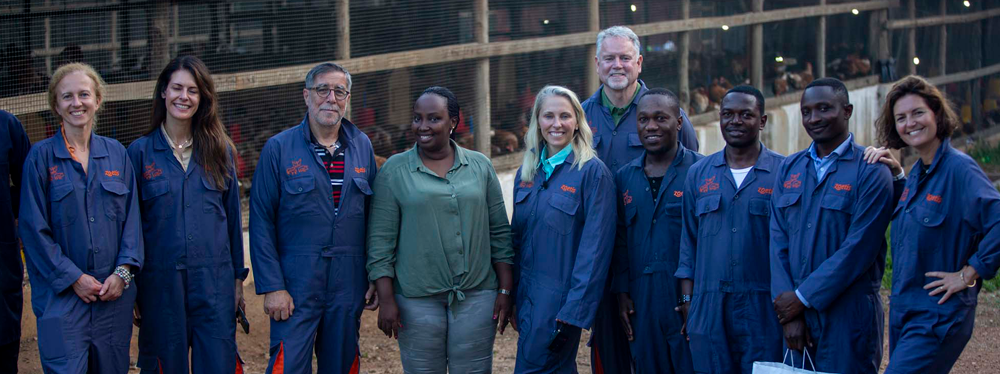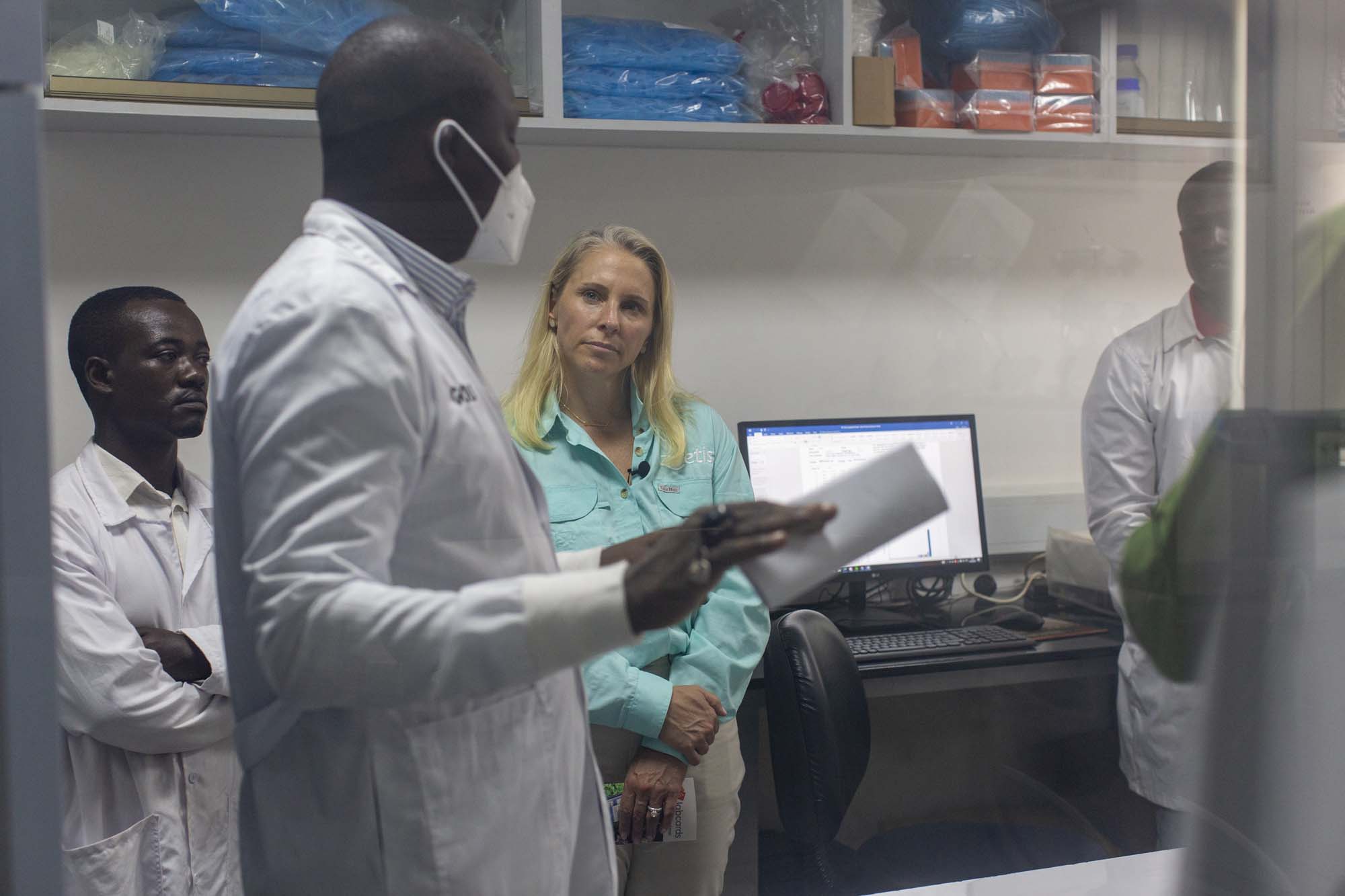Zoetis celebrates the success of its Alpha initiative to improve livestock health in Africa

Zoetis Today he reported on progress over the five years of his initiative to boost livestock productivity and health in Africa (Alpha, for its acronym in English) to establish sustainable veterinary care including access to vaccines, medicines and diagnostic services in Uganda, Nigeria, Tanzania and Ethiopia.
The initiative, which was jointly funded with Bill and Melinda Gates Foundationconcludes five years of progress in improving the health and productivity of livestock and the livelihoods of livestock keepers in sub-Saharan Africa.
“The Alpha initiative has helped veterinarians improve their medical knowledge, while supporting farmers to improve productivity and make the sector more sustainable. Currently, livestock farmers in the region are adopting better practices with livestock, which improves their profitability, income and quality of life,” he said. Olottoin Catherine AdetoperoAnd the DVMPresident of the Nigerian Veterinary Medical Association (nvma), who presented a case study on the impact of the initiative in Nigeria.
“Animal health is critically important to help achieve sustainable economic development goals and business opportunities in Africa,” he said. Glenn DavidExecutive Vice President and President of Zoetis Group.
Agriculture and livestock are the main sources of livelihood for the people of sub-Saharan Africa. He noted that if we improve access to essential veterinary products and services and support the quality of animal health care infrastructure, we can have a positive impact in the long run.
“We have seen first-hand the effects of improved animal health in sub-Saharan Africa and have worked in collaboration with local institutions to develop veterinary education and sustainable livestock productivity solutions,” he explained. Mike McFarlandand DVM and chief medical officer of Zoetis.
“Looking forward, we are taking steps to ensure that we continue to support veterinary education and training and create the necessary infrastructure to help veterinarians and ranchers continue to improve the health and productivity of their livestock and their livelihoods.” highlighted.
Sustainable development achievements in five years
The Alpha Zoetis initiative helps meet its aspirations to expand veterinary care in emerging markets as part of the project’s long-term sustainability goals. driven by carea goal rooted in the company’s goal of feeding the world by advancing animal welfare.
By focusing its innovative expertise and partnerships on solving sustainability challenges facing animals and humans, Zoetis is committed to helping achieve the Sustainable Development Goals (SDGs).SDG) to the United Nations.
Through its Alpha initiative, the company has significantly improved livestock health and the livelihoods of farm owners in sub-Saharan Africa in three key areas, including improving the availability of veterinary medicine and the rate of medical treatment.
with marketing 91 new veterinary products (Vaccines, antiparasitic treatments, and medicines), Zoetis allowed 128 million animals (124 million chickens and 4 million cows) receive good health care and produce safe food. When the program was launched in 2017, just Four products in the region.
One of the main objectives of the Alpha Initiative was to disease prevention in poultry. Zoetis has given access to a wide range of poultry vaccines, which it hopes to help Disease prevention previously reduce treatmentincluding Use of antibiotics in these animals.
On the other hand, the provision of sustainable diagnostic infrastructures, which in five years of activity, the company has made significant progress in establishing infrastructure and training to improve the health status and productivity of animals.
Similarly, from Zoetis they confirm that sixteen labs Sera Providing diagnostic services to farmers in Nigeria, Tanzania, Ethiopia and Uganda. The laboratory network has been strengthened in collaboration with local partners from the public and private sectors and now provides access to a significant portion of the continuing care provided by Zoetis (Diagnosis, prevention and treatment) Even for small producers, they do it close to home in four countries.
Finally, since 2019, Zoetis experts have implemented a large number of Training sessions To local veterinary service providers, diagnostic laboratory staff and farmers, in collaboration with local authorities, associations and NGOs, to increase the level of care and knowledge of disease management and veterinary care.
So far it has been formed More than 26000 farmersveterinarians and veterinary professionals (VPP, for its English acronym), of which about 30% of women, and is estimated to reach more than 1.3 million people through training of trainers programmes.

Key conclusions, animal health constraints and solutions
The Alpha initiative revealed a great need for access to training and education on the use of the products and veterinary servicesas well as a general understanding of the benefits that advanced animal care brings to farm productivity.
Those responsible for the initiative identified the need to focus on when and how to vaccinate an animal; Diagnose the disease correctly with the help of veterinarians and other professionals; And how to treat the disease and productivity recovery Livestock and improved health management on the farm.
We have learned that starting an animal vaccination program will not work if the minimum requirements for biosecurity on the farm are not respected. For this reason, we have organized educational and training sessions for small farmers on biosecurity and disease preventionand responsible use of medicines and veterinary diagnosis.” Gabriel VargaDVM, Regional Director for Sub-Saharan Africa, Zoetis.
Thus, they explained, sub-Saharan Africa is home to one of the world’s largest livestock concentrations and the highest density of poor livestock keepers. Livestock is a primary asset of village communitiesImproving animal health and the productivity of small-scale farmers are essential to this. Food SafetyIn areas with exceptionally high rates of animal and human diseases.
“We look to the future with optimism and a wealth of knowledge and experience that will help us better serve our animal health collaborators in sub-Saharan Africa,” Varga added.
“But we have a long way to go in our work in these emerging markets, and we’ve set that. different strategies Which we can put into practice with key local partners. Quoting an African proverb: “If you want to go fast, go alone; but if you want to go far, go together. This reflects the importance we place on cooperation to help serve the region.”
WORKING FOR UN FOOD SYSTEMS SOLUTIONS
One of the solutions proposed by FAO to reduce livestock emissions by 30% is to promote rapid adoption of existing and scalable best practices and tools in animal health and livestock.
The impact of the Alpha Initiative, and more generally on community development through livestock productivity, helps improve Livestock health So that the production of proteins is more positive for nature, and significantly improves the efficiency of use Natural Resourcesreducing the need for new agricultural land and supporting population growth.
“Our approach is unique in terms of sustainability, which is essential to promoting a mental shift in the livestock sector towards spirit Businessman and property. Strengthening the agricultural and veterinary sectors is essential if sub-Saharan Africa is to meet the region’s growing productivity needs in sustainableVarga emphasized.


“Award-winning zombie scholar. Music practitioner. Food expert. Troublemaker.”









